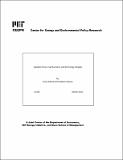Gasoline Prices, Fuel Economy, and the Energy Paradox
Author(s)
Wozny, Nathan; Allcott, Hunt
Download2010-003.pdf (790.2Kb)
Metadata
Show full item recordAbstract
It is often asserted that consumers purchasing automobiles or other goods and services underweight the costs of gasoline or other "add-ons." We test this hypothesis in the US automobile market by examining the effects of time series variation in gasoline price expectations on the prices and market shares of vehicles with different fuel economy ratings. When gas prices rise, demand for high fuel economy vehicles increases, pushing up their relative prices. Market share changes - increased production of high fuel economy vehicles and scrappage of low fuel economy vehicles - attenuate these price changes. Intuitively, the less that equilibrium vehicle prices and shares respond to changes in expected gasoline prices, the less that consumers appear to value gasoline costs.
We estimate a nested logit discrete choice model using a remarkable dataset that includes market shares, characteristics, expected usage, and transaction price microdata for all new and used vehicles available between 1999 and 2008. To address simultaneity bias, we introduce a new instrument for used vehicle market shares, based on the fact that gasoline prices cause variation in new vehicle shares that then persists over time as the vehicles move through resale markets. Our results show that US auto consumers are willing to pay just $0.61 to reduce expected discounted gas expenditures by $1. We incorporate the estimated parameters into a new discrete choice approach to behavioral welfare analysis, which suggests with caution that a paternalistic energy efficiency policy could generate welfare gains of $3.6 billion per year.
Date issued
2010-03Publisher
MIT Center for Energy and Environmental Research Policy
Other identifiers
2010-003
Series/Report no.
MIT-CEEPR (Series);10-003WP